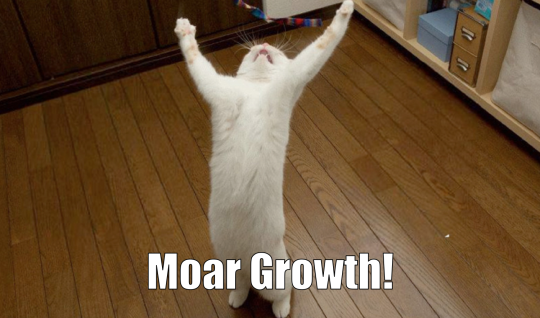The reason growth hacking works has nothing to do with growth hacking and everything to do with blowing up organizational silos.
What Is Growth Hacking?

Marketers love to market. We’re forever repackaging and rebranding, even when it comes to our own profession. Can you blame us really? We’re frequently the last ones to get the credit and the first ones to get the blame and corresponding pink slip.
Nevertheless these redefinitions often induce a sigh and eye-roll from yours truly. Do we really have to go through all this again? Perhaps I’m just cranky and getting old.
Sean Ellis was the first to bring the term growth hacking to the mainstream in his 2010 post.
A growth hacker is a person whose true north is growth. Everything they do is scrutinized by its potential impact on scalable growth.
They must have the creativity to figure out unique ways of driving growth in addition to testing/evolving the techniques proven by other companies.
An effective growth hacker also needs to be disciplined to follow a process of prioritizing ideas (their own and others in the company), testing the ideas, and being analytical enough to know which tested growth drivers to keep and which ones to cut.
His piece compares this to a rather bloated and generic job description for a marketing hire. Perhaps those descriptions exist but this would point toward a larger problem of simply not understanding online marketing.
Andrew Chen followed up with a post that emphasized this division between a ‘traditional marketer’ and a growth hacker.
Let’s be honest, a traditional marketer would not even be close to imagining the integration above – there’s too many technical details needed for it to happen. As a result, it could only have come out of the mind of an engineer tasked with the problem of acquiring more users from Craigslist.
Who is this traditional marketer? I worked as a marketer through both Web 1.0 and Web 2.0, hustling for ‘growth’ wherever I could find it.
Maybe I had an advantage because I came from a direct marketing background. I believe in data. And I love digging into technology.
No OLAP tool? Teach myself SQL. Want to change something on my blog? Learn PHP, HTML and CSS. Need a handy bookmarklet? Learn a bit of JavaScript.
I was (and still am) looking at emerging platforms and tactics to get eyeballs on a brand and productive clicks to a site. And you better be measuring the right way. Get the measurement wrong and you might not achieve real growth.
There are plenty of marketers figuring this stuff out. And plenty of marketers who aren’t.
The Lazy Marketer

I’m frequently hard on marketers as a group because there are a number of them who seem more consumed by expensing dinner and covering their asses while being able to point at the well-regarded vendors they hired to do the work than actually understanding and doing the work themselves.
Lazy marketers piss me off because they give all marketers a bad reputation. So I understand why folks like Sean and Andrew might want to create an artificial construct that excludes lazy marketers.
But the truth is that marketers have been growth hacking for decades. You don’t think sophisticated RFM campaigns aren’t a form of growth hacking? I could tell you a thing or two about the strange value of the R dimension.
Brand marketers use data to understand aided and unaided recall. And I remember being shocked as a young account coordinator at an advertising agency at the calculations used to determine the value of sponsorships based on the seconds of TV exposure it generated.
Growth hacking is really just a rejection of lazy marketing.
Because … Growth

I see little distinction between talented online marketers who use technology and data to secure gains and the newly minted growth hackers. They’re drawing on the same skills and mindset.
I’ve been lucky to get a peek into a decent number of organizations over the last few years. What I’ve come to realize is growth hacking works or … can work. But it has everything to do with how an organization integrates growth.
The secret to growth hacking success is the ability to go anywhere in the organization to achieve growth.
A good growth hacker can push for traditional SEO changes, then hop over to the email team and tweak life cycle campaigns, then go to design and push for conversion rate optimization tests, then engage engineering and demand that the site get faster and then approach product with ideas to improve gradual engagement.
When that growth hacker gets pushback from any of these teams they can simply fallback on the central mantra. Why should we do X, Y and Z? Because … growth!
Organize For Growth

As much as I hate to admit it, the term growth hacker often provides a once constrained marketer with greater opportunity to effect change in an organization. A growth hacker with the same skills but a marketing title would be rebuffed or seen as over-stepping their responsibilities.
“Stay in your lane.”
That’s what many talented marketers are told. You’re in marketing so don’t go mucking around in things you don’t understand. It can be wickedly frustrating, particularly when many of the other teams aren’t relying as heavily on data to guide their decisions.
The beauty of the term ‘growth hacker’ is that it doesn’t really fit anywhere in a traditional sense. They’re automatically orbiting the hairball. But the organization must support ventures into all areas of the company for that individual (or team) to succeed.
Simply hiring a growth hacker to work in marketing won’t have the desired impact. I see many companies doing this. They want the results growth hacking can deliver but they aren’t willing to make the organizational change to allow it to happen.
Growth Hackers

Hopefully I’ve convinced you that organizations need to change for growth hacking to be successful. But what about the growth hackers themselves?
The job requires a solid rooting in data and technology with an equal amount of curiosity and creativity to boot. Where the rubber really hits the road is in communication and entrepreneurial backbone.
A good growth hacker needs a fair amount of soft skills so they can effectively communicate and work with other teams. Because even if the organization supports cross-functional growth, those teams aren’t always pooping rainbows when the growth hacker knocks on their proverbial door.
Amid these grumbles, growth hackers are often under a bit of a microscope. As the cliche goes, with great power comes great responsibility. So the growth hacker better be ready to show results.
That doesn’t always mean that what they try works. Failure or ‘accelerated data-informed learning’ is a valuable part of growth hacking. You just better be able to manage the ebb and flow of wins and not lose the confidence of teams when you hit a losing streak.
Frankly, good growth hackers are very hard to find.
TL;DR
Growth hacking skills are nothing new but simply a rebranding exercise for tech-savvy marketers sick of being marginalized. But growth hacking only works when an organization blows up functional silos and allows these individuals to seek growth anywhere in the company.
The Next Post: Do You Even Algorithm, Google?
The Previous Post: My Favorite SEO Tool

Comments About Why Growth Hacking Works
// 4 comments so far.
John Wiehe // April 14th 2015
Hi AJ,
What are your thoughts on “Growth Hackers,” whose job only seems to be increasing numbers, such as, more Facebook Likes, more followers on Twitter, more comments on blogs, etc.? I know of some “Growth Hackers” who run such programs as Ruby and Python to do the jobs I enumerated but that sounds different than your definition.
AJ Kohn // April 16th 2015
John,
I’m not keen on a ‘blinkers’ approach to growth hacking. Achieving growth in any of the examples you provide might lead to true growth or … it might not. How valuable are those Likes and followers? As a result are more people actually clicking through and taking the action you want?
To me growth hacking is about impacting business growth. I might get a ton of traffic if I promised folks ‘free beer’. So if the goal was increase traffic then mission accomplished! But if I don’t offer beer and all of those people don’t do anything for my business then what’s the point?
That’s why the right measurement is critical.
Brian Swanick // April 15th 2015
Hey AJ, was just reading another blog with a reference from Zero to One by Peter Thiel on growth–perfect for this post. It’s a great read on the subject of technology vs. engineering, or growing by X vs. growing by n. For marketers, we are often approached by companies who would like to build something new and need to grow 5000% this year ( growth by X) or by companies who want to break up the top incumbents and grow by 20% (growth by n). Each company has a cultural mindset, and marketers should take on that cultural mindset to be more effective.
As you said, the typical marketer isn’t going to ignore growth on purpose (I’m excluding companies looking to be more efficient right now). But a lazy marketer is not going to achieve as much growth, especially if the organizational culture or structure is not geared for growth, as someone who is hellbent on it and given the tools to succeed.
I think that what you’re alluding to is similar to the war-time vs peace-time CEO sentiment, where at some stage of a successful company’s life, you are in a battle and you need ferocious, fearless leadership to beat out your competition. They have to focus on growth-hacking Minor details be damned, they needed growth to survive the next 12 months.
At times of less innovation and competition, focusing on being operationally effective is smarter. Do you have the processes in place to support a marketing department of 50? Do you want to spend resources to growth hack a market that appears close to being capped?
Name is a bit of a waste of brain space, but I hope it helps us digital marketers get more in tune with understanding high growth vs efficiency mindsets.
(Also, Amazon link to Orbit the Hairball is broken, AJ. Just a FYI )
Soumya Roy // July 01st 2016
It’s a very good read. I am a Digital Marketing & SEO professional and trainer. In my profession, I meet lots of people and marketers and many of them like to call themselves as growth hackers. Now a days there are lots of growth hacking workshops are happening but honestly speaking I am a bit clueless about those. I like to meet people from diversified industries & domains, I like to interact with them, show them how I work and how my works helped others, and those work good for me and my business. I don’t know whether I am a hard working marketer or a lazy marketer but I do not leave any opportunities, online or offline, where I can do something good for my business as well as for the industry. Thanks for sharing this post with us.
Sorry, comments for this entry are closed at this time.
You can follow any responses to this entry via its RSS comments feed.